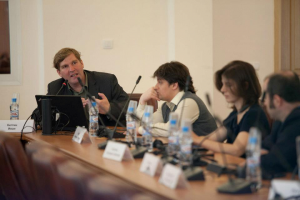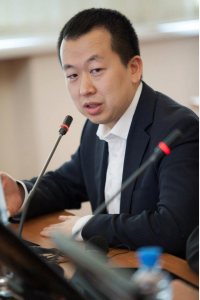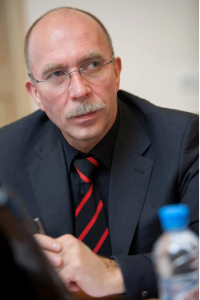
On June 5th at the Higher School of Economics in Moscow a round table conference took place,
devoted to the opening of state-collected datasets. It was convened by the Higher School
of Economics (HSE) together with the Russian Office of the World Wide Web Consortium
(W3C). Open data is the new trend in the state practices of the developed countries, and
Russia also acknowledges the importance of this trend. The Presidential
Decree of May 7th 2012, “About key measures for the improvement of the state governmental
system” states that it is important to publish open government data by July 15th,
2013.

Oleg Pak, from the Ministry of Economic Development, told the round-table that his department is currently developing the standards and the concept of open data in Russia. Within the framework of this concept, they will develop a comprehensive strategy for open data usage in Russia. This concept should become a roadmap for the work of all authorities engaged in the realization of this vision.
As a rule, the realization of national projects for open data has two goals. The first is socio-political – the
State should open the data for its citizens. This goal can be easily achieved with the
existing level of technology. The main issue at the discussion in June was the achievement of
the second goal: the transformation of state data arrays into a product suitable for
cost-effective use. This would allow businesses to form a new structure of services, and offer
previously non-existent things on the market.

In many countries, this is already happening, as Victor Klintsov (W3C, HSE) pointed out. “The USA Administration has already published over a million data sets. This has been published not for “readers”, but for computers and services which
use this data for development of new data, products and services”, he said. Pavel Pugachev (Ministry of Communications and Mass Communications) cited the example of an IT-company in the US. Its programmers use anonymised medical data about outbreaks and numbers of patients, process it and supply large pharmaceutical companies with the results. This allows those companies to develop their demand and supply tactics. Pugachev suggested we ought to determine the open data priorities according to which data types will be most interesting to the market, and concentrate our efforts on opening them first and foremost.
A key issue in the data that is being opened in Russia is that of interoperability. Releases so far have been based on the idea of human consumption – it is largely unsuitable for computer “consumption”, being unmatched and in different formats. This massively limits its business potential. Meanwhile, in Moscow alone there are 4,000 portals state-owned portals and
organizations without consistent principles of data delivery. Common publishing standards need to be established as a matter of priority.

Nonetheless, as Daniel Hladky (W3C) pointed out, we cannot simply wait for the development of all the regulations that will allow perfect publication: “Publish, what you have. As
you can and by any means. Good or bad, with mistakes, unattractively, even if 90% of this
data will be badly structured. Maybe it lacks metadata. I would like to say that it is
necessary to pick up speed. If 5% of the information is useful, it will be a start and a
push for the development of business”. In developed countries
the open data market started not from acts of government, but from the activity of
individuals who collected information and published it on their portals, bringing
it up to a machine-processable state.
This opinion was supported by Maksim Dubinin (OpenStreetMap, GIS-Lab projects): “The
community of users and the culture of usage will not appear until open data is presented
in large enough quantities”. He shared his experience in the area of geodata. “When it
became clear that it was impossible to wait for governmental steps in this field,
projects started to appear in which users contributed geodata by themselves. Over 600,000 people around the world have taken part in the OpenStreetMap project. As a result, some governmental organizations have started using data
created by users.”
Undoubtedly, this needs to come from both ends at once.
Progress with Russian open data projects will be presented by Daniel Hladky during the
European commission workshop Using Open Data: policy modeling, citizen empowerment,
data journalism, which is going to take place in Brussels this week.
Victor Klintsov promised that the next meeting of the round table participants will be held this
autumn. W3C office is planning to invite the leaders of open data projects from
the USA and Great Britain.
The shorthand transcript and presentation graphics of the round table conference will be
published on the site of W3C Russian office www.w3c.org.ru
Ivan is director at NGO "Informational Culture" and founder of the OpenGovData.ru project, as well as lots of other Russian e-Government and open data initiatives. He is a member of the OKF's working group on open government data.
He has worked as a programmer, systems architect and project manager of various russian system integration companies, and has more than 6 years experience in russian procurement automation and e-Government projects.









1 thought on “On the way to the new market of information in Russia”
Comments are closed.